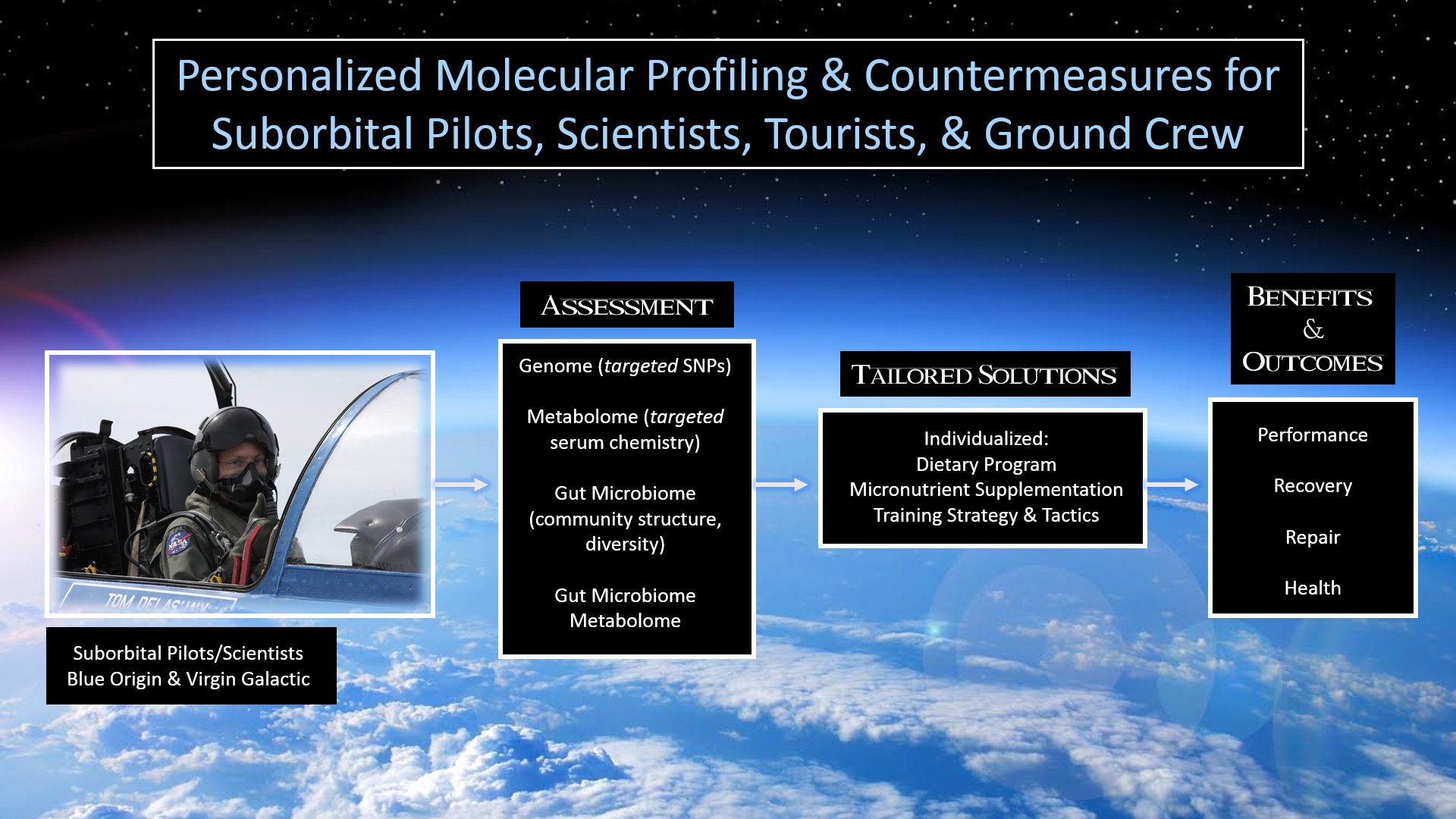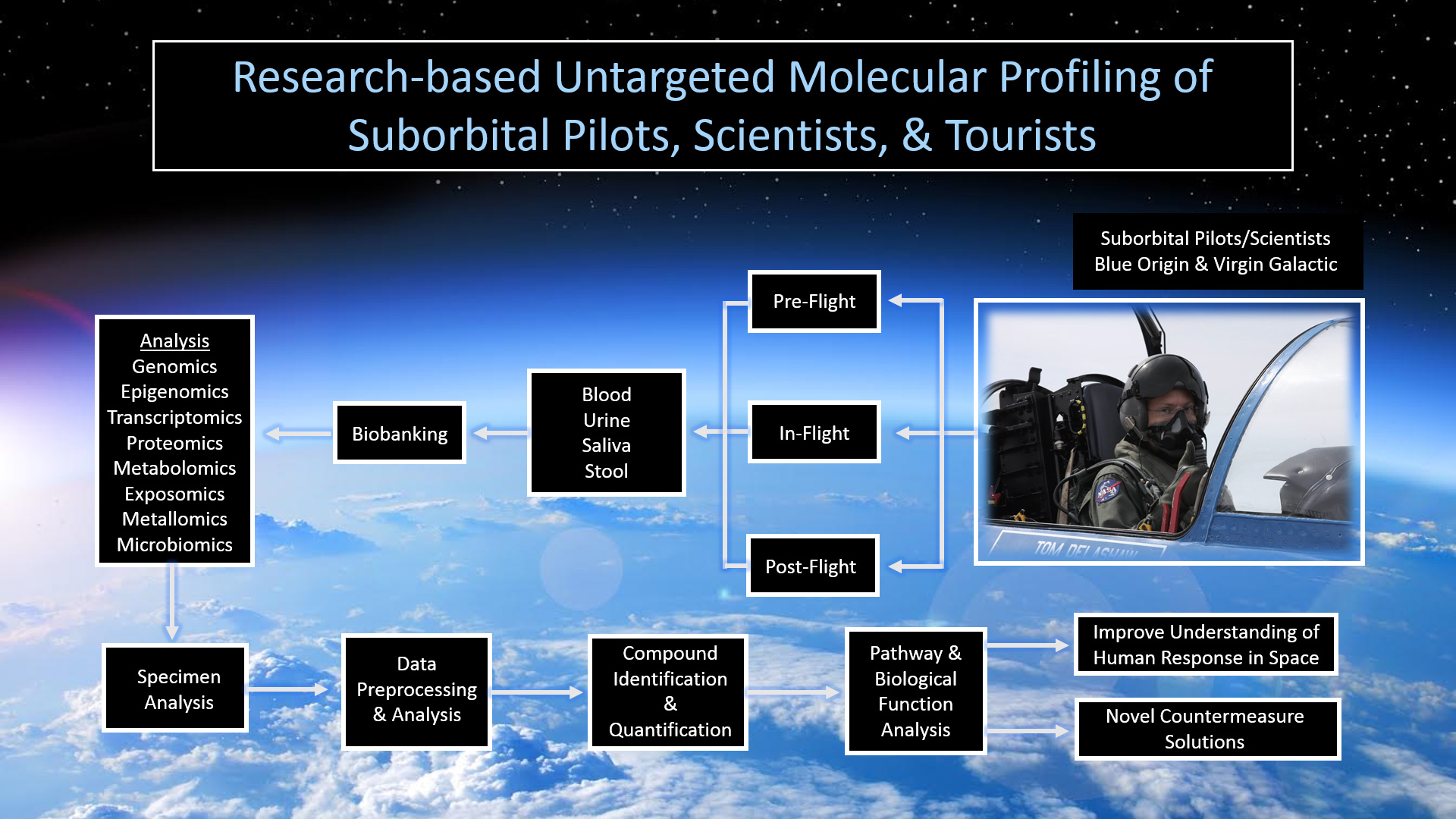Personalized Medicine
for Humans in Space
The NASA Twins Study

Advancing Personalized Medicine and Spaceflight Research
Sovaris Aerospace has incorporated knowledge gained from the Twins Study (specimen capture, pre-analytical methods, analytical methods, data analysis and interpretation) and coupled it with our decades of experience to further advance the molecular assessment methodologies in our spaceflight research. Going forward, this knowledge allows us to advance the concept of personalized countermeasures (personalized medicine, precision medicine) that are intended to optimize the safety and performance of individual humans entering space.
- what is actionable today
- what may be actionable in the near term (given more evidence)
- what may be actionable in the far term
Molecular Analytics and Countermeasures for Humans Entering Space or Space Analog Conditions
A range of molecular profiling approaches are available that can be used to characterize the molecular dynamics in an individual. These methods are generally described as ‘targeted’ and ‘untargeted.’ In targeted molecular profiling, the analytes to be measured are predetermined. We typically use these for personalized medicine in the clinical or performance (countermeasure) setting. In untargeted analysis, a broad suite of analytes are examined, which are not predetermined. In such analysis, several thousand molecular forms are examined. This is typically applied in a research setting. Quite often, targeted and untargeted analysis are performed in tandem. This is especially true in the research setting, though a strong case can be made that this approach also more rapidly advances spaceflight medicine.
In the human performance setting, we typically assess within the following molecular classes (though we quite often go well beyond, depending upon the objective). The aim is to better describe molecular dynamics in an individual, identify actionable molecular targets, and apply countermeasures directed to the individual (personalized countermeasures): These molecular analyses include, but are not limited to:
- Blood chemistry: serum, plasma, or whole blood; metabolites, proteins, particles, and fractions that are foundational to metabolism
- Genes: single nucleotide polymorphisms (SNPs); indels; copy number variants; (sometimes coupled with whole exome)
- Essential and conditionally essential inputs: amino acids, fatty acids, vitamins, minerals, trace elements, antioxidants, methyl donors
- Organic acids (urine): metabolic intermediates, small molecule metabolites, microbial metabolites
- Gut microbiome: metagenome of gut microbial community; community structure; diversity
- Gut microbiome: metabolome, or gut small molecule pool (<1500 amu), representing microbial and human co-metabolism (also diet and environment)
- Skin microbiome: metagenome of skin microbial community; community structure; diversity
- Pharmacogenomics: SNP profiling to describe the unique drug metabolizing characteristics of an individual, used for tailoring drug therapy
Services
Our services in support of personalized medicine (precision medicine) in spaceflight span four primary areas. These include:
- Research: Our molecular profiling research collaborations support investigator teams working to study the application of precision medicine in spaceflight research. This includes:
- Clinical research
- Fundamental space biology directed at specific human research questions
- Countermeasure Strategy: This is closely aligned with research, and involves development of strategies and specifications that can be deployed into the spaceflight environment
- Clinical Testing & Support: Our clinical laboratory testing and support can assist spaceflight medical directors, flight providers, spaceflight participants, and other associated with spaceflight to profile and assess individual and team molecular profiles, as part of countermeasure development with the goal of optimizing mission safety.
- Training: We work with our clients/collaborators on two primary areas of training relative to spaceflight precision medicine:
- General training in the subject matter, which includes theory, current applications, and limitations
- Training associated with our Spaceflight First Responder and Spaceflight Advanced Life Support programs. These incorporate concepts of precision medicine, as pre-mission logistical considerations aimed at optimizing the space flight experience and limiting adverse events.



At Sovaris Aerospace, we believe that widespread molecular (including omics) profiling should serve as the foundation for aerospace medicine research. As part of our prior and our ongoing work, we develop methodological approaches to advance the field of space medicine research with a continual focus on actionable countermeasures. In addition, we have developed molecular-based assessment and countermeasures that can be deployed today, while recognizing that near- and far-term innovation will continually be required to advance the field. In this context, we are strongly committed to contributing to the evolution of personalized medicine, as the standard of care for humans in space.
